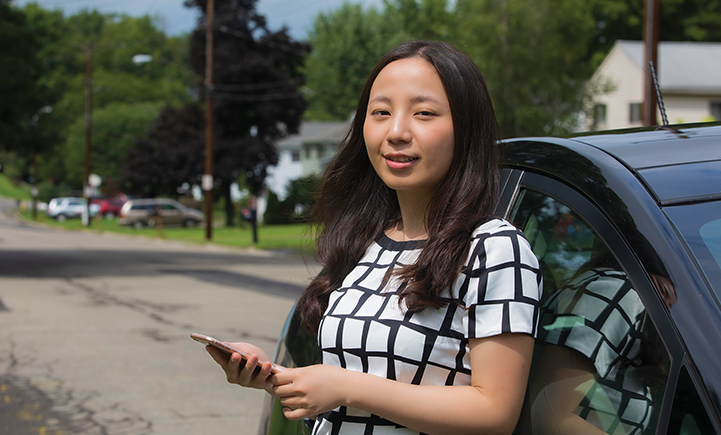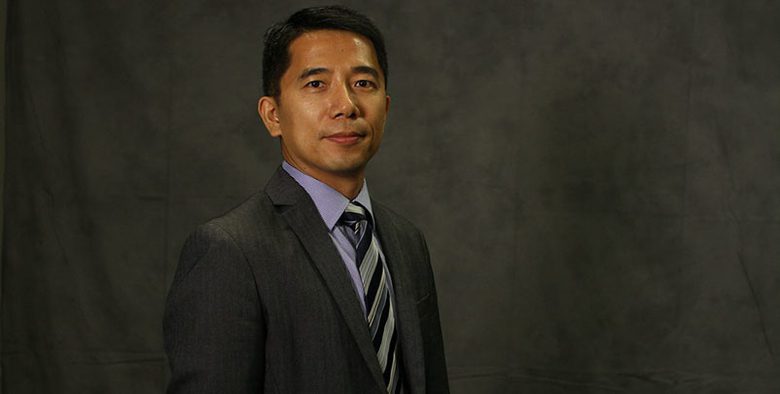5 Questions With Pasquale Quintero, MBA Director at the TCNJ School of Business

In our latest installment of the MetroMBA “5 Questions” series, we speak with Pasquale Quintero, MBA Director at the at the TCNJ School of Business. Quintero talks about the school’s new MBA program, the “T-Style” curriculum, and the best food you can get in Trenton, NJ.
Why do you believe TCNJ introduced its new MBA program?
“The College of New Jersey School of Business is delivering a contemporary, relevant, highly competitive MBA education that provides both near-term and long-term benefits to early career professionals. Employers want employees with strong skill sets in a specific area and a broad understanding of business on which they can build. Employees want to build successful and stable careers. Therefore, the School of Business determined students need immediate applicable specialized skills, hence the creation of the ‘T-Style’ curriculum.”
What can you expect for the first year of the program?
“The ‘T-Style’ offers students the ability to specialize in Data Analytics, Finance, or Strategy, Innovation and Leadership during their first year of study. In the second year, students will round out their education by taking courses designed to equip them with the tools to be effective managers. This approach provides the student with depth, breadth, and an early return on investment with a graduate certificate after their first year of study.”

“Third, the program is offered in a hybrid format (online and face-to-face), which will allow students to enroll in the MBA program without disrupting their personal and professional obligations,” Pasquale notes.
What are the differences between the TCNJ MBA and other business schools?
• “First, our unique ‘T-Style’ curriculum offers students the benefit of deep dive learning in a specialization in Data Analytics, Finance or Strategy, Innovation and Leadership during their first year of study. Students will gain enhanced skills to apply in their day-to-day decision-making.
• Second, the program will have a business practitioner associated with each course. The faculty will use the practitioner to help reinforce and expand upon the application of MBA concepts in practice.
• Third, the program is offered in a hybrid format (online and face-to-face), which will allow students to enroll in the MBA program without disrupting their personal and professional obligations.
• Students meet in class for eight hours on Saturdays, six times in the fall and spring, plus four times in the summer. When not meeting face-to-face, students will complete their coursework online. Winter courses will be offered 100 percent online.
• Finally, the program is price competitively.”
What is one major advantage TCNJ provides in the new program?
“The innovative ‘T-Style’ curriculum as it is taking a different approach to graduate management education. After just one year students can demonstrate real progress in a specialty area after just seven courses.”
Where can I get some good food in Trenton?
“On campus there are some great restaurants such as Mexican Mariachi, Piccolo Pronto, and Yummy Asian Cuisine. I’ve heard good things about Cafe ’72 near campus, and there are plenty of great restaurants to choose from in downtown Princeton.”
Wage Transparency, Rideshare Payouts, and More – New York News

Let’s explore some of the most interesting stories that have emerged from New York business schools this week.
Wage Transparency Works: Reduces Gender Pay Gap by 7 Percent – Columbia Business School
New joint-research from members of the Columbia Business School, INSEAD, the University of Copenhagen, University of North Carolina Kenan-Flagler Business School, and Cornell’s SC Johnson College of Business finds that wage transparency can help close the gender pay gap
Columbia’s Daniel Wolfenzon and his co-authors examined the effect of a 2006 requirement for Danish companies to report on gender pay gaps.
“What surprised us the most was the way in which this wage gap closed. Women’s wages did not increase at a faster rate in treatment firms as we were expecting. Instead, we find that men’s wages in treatment firms grew slower relative to men’s wages in control firms. As a result, the total wage bill grew slower in firms that were required to report wage segregated statistics,” Wolfenzon says.
“What is interesting is that the law has unintended consequences on women’s ability to climb up the corporate ladder and their willingness to join the labor market. When firms adopt fairer wage practices towards women, this can have positive effects on women’s labor market outcomes that go well beyond pay gaps,” UNC Kenan-Flagler Assistant Professor of Finance Elena Simintzi says.
You can learn more about the wage transparency research here.
Market-Driven Drivers: Dynamic Payout Ratio Means More Money, Less Wait – Binghamton School of Management
With the rise of on-demand services from ridesharing, we have become accustomed to getting what we want, when we want it. Binghamton University School of Management Assistant Professor of Supply Chain Management Jiaru Bai knows the secret to discovering how to handle impatient customers: data.

“Having a dynamic payout ratio almost always performs better than a fixed payout ratio, according to our model and data analysis,” says Binghamton Assistant Professor Jiaru Bai / Photo via Jonathan Cohen
Bai and her fellow researchers analyzed rides from Didi, China’s largest on-demand ride-hailing service platform. They found that the optimal solution is to flexibly determine the payout percentage, rather than adhere to a rigid, fixed rate.
“Basically, when demand is high, providers should get paid a higher percentage, and when demand is low, providers should get paid a lower percentage. Having a dynamic payout ratio almost always performs better than a fixed payout ratio, according to our model and data analysis, and it leads to benefits for all involved,” Bai says.
You can read more about the ridesharing research here.
New Research Shows U.S. Consumers Prefer Brands that Support Refugees – NYU Stern Experience News & Events
According to a new report titled “How Helping Refugees Helps Brands” from the NYU Stern School of Business and the Tent Partnership for Refugees, American consumers are more likely to purchase from brands that support refugees. This includes brands that hire refugees, deliver services to refugees, invest in refugee entrepreneurs, and source from refugee businesses.
“This report shows that consumers will reward brands that support refugees,” says Gideon Maltz, Executive Director of the Tent Partnership for Refugees.
“In a crowded marketplace, brands that integrate refugees into their business can distinguish themselves from their competitors, especially among millennials. This is a clear demonstration that brands can do well by doing good.”
The Tent Partnership for Refugees, founded by Chobani’s Hamdi Ulukaya, is mobilizing the private sector to improve the lives and livelihoods of more than 25 million refugees. Ulukaya launched Tent with the hope that the private sector is uniquely positioned to address the global refugee crisis, mobilizing networks, resources, innovation, and the entrepreneurial spirit of the business community. There are over 100 companies in the Tent Partnership supporting refugees across 34 countries, which can be found here.
Professor Tülin Erdem, co-author of the report and chair of NYU Stern’s Marketing Department adds, “It impacts brand image and consumer brand purchase behavior positively.’
“This is consistent with current consumer (especially the millennial consumer) preferences for brands that take a strong stance for social issues and consider the welfare on multiple stakeholders, including the society at large.”
The full report can be accessed online. For more, check out the recent NYU Stern article here.
Energy Conservation, Healthcare Struggles, and More – New York News

Let’s explore some of the most interesting stories that have emerged from New York business schools this week.
Do as Your Neighbor Does? Neighbors Caring about the Environment Makes You More Likely to Conserve – Columbia Business School
When it comes to interpersonal decisions, group elements often become a heavy factor, including with conservation.
Columbia Business School Professor Adam Galinsky recently co-authored a new study in Nature Human Behaviour that may offer insight into how to affect meaningful changes toward climate conservation.
By focusing on “second-order normative beliefs,” the researchers illuminate that when it comes to topics like energy conservation, for instance, “what people believe their community members care about is an important predictor of individual conservation behavior, above and beyond people’s own beliefs about energy conservation.”
Galinsky explains, “The evidence shows that policymakers can’t simply ask people to reduce, reuse, and recycle. In fact, trying to reach people with subsidies for environmentally-friendly decision-making can backfire. Instead, the roadmap to improving perceptions of conservation starts with reminding individuals that their neighbors care about it. It’s important to shift the focus from trying to change what people believe to reinforcing what their friends believe.”
You can learn more about the research here.
Faculty Snapshot: Finding a Remedy for Health Care’s Struggles – Rutgers Business School News
The Rutgers Business School recently profiled Assistant Professor of Supply Chain Management and Program Director for the Masters of Science in Healthcare Services Management, Xin (David) Ding, whose research studies “potential ways to increase hospital revenues through process coordination, patient involvement, and the cultivation of a patient safety environment.”

Professor Xin (David) Ding / Photo via business.rutgers.edu
The recent profile in Rutgers Business School News reads:
“While physicians and nurses traditionally have been trained to take care of clinical needs from patients, they don’t necessarily know how to manage operations and businesses well. With the transition from volume-based care to value-based care, supply chain concepts can help care providers maximize value through the optimization of their resource allocations.”
You can read more from the profile here.
In the Future, Everyone Will Be Able to Make Robots – Stevens Institute of Technology SOB News
The Stevens Institute of Technology President’s Distinguished Lecture Series recently hosted prominent robotics and AI researcher Daniela Rus who “challenged the audience to rethink conventional notions of robots.”
“Imagine the limitless possibilities that could arise from the ability to create the machines that can help save lives, improve the quality of life, or transport us to places we cannot go to on our own,” she notes.
“Right now we have the ability to use our technologies, coupled with interesting interfaces, to enable much more extensive capabilities. And while, today, we can begin to use natural language to program machines, how far can we go in connecting us directly to the machine?”
You can learn more about Rus’ research here.
Upcoming December MBA Application Deadlines

As winter approaches and December comes into clear view, let’s review all the major upcoming MBA application deadlines for December and January. Get those applications in ASAP so you have more time to enjoy the holidays with friends and family as you await your acceptance letter in 2019. Best of luck, and Happy New Year in advance! Continue reading…
Telecommuting and the Gig Economy, and More – New York City News

Let’s explore some of the most interesting stories that have emerged from New York business schools this week.
The Changing Workplace – Lehigh College of Business and Economics News
The Lehigh College of Business and Economics recently published an overview of the impact that telecommuting continues to have on the future of work—and the surging gig economy.
“With email, instant messaging, smartphones, Skype for Business, Webex, and other connecting technologies, more and more companies are allowing their employees to work from home—even if home is a thousand miles from the corporate headquarters.”
Case in point: Vermont Department of Economic Development’s recent announcement that it would give $10,000 cash to anyone who wanted to move to the Green Mountain State and work remotely.
Ride-hailing services Uber and Lyft, as well as platforms like Upwork, which connect organizations and freelancers, depend on the flexible schedules of side-hustlers and entrepreneurs alike.
Lehigh Associate Professor of Management Naomi Rothman writes, “Being able to work from home for periods of time to care for children could enable more women to stay in the workforce and advance. If we have these issues of women not being able to make it to the upper echelons of corporate America, part of that reason is they are having work/life-balance issues.”
She adds, “Flexibility is one of the most important and critical solutions in helping dual-career families. In families in which you have two professions with both parents working, issues of child care become a fundamental problem. Flexibility is one thing that parents say allows them to keep their careers on track.”
Lehigh Professor of Management Andrew Ward predicts that the larger economy will more closely resemble the structure of the motion picture industry.
“When a movie is [green lit] by a studio, they bring together hundreds, even thousands, of workers—from the director and stars to the gaffers and the gofers—to make the movie. Once the film is done, they all move on to other projects. Some continue to work together on various projects, sometimes at the same studio, but many do not.”
You can read the full Lehigh College of Business and Economics News article here.
Consulting Challenge Win Leads to Hubble Contacts Concept Trial – Gabelli Connect
The Fordham University Gabelli School of Business recently published an overview of a recent student collaboration with Hubble Contacts’ co-CEO and co-founder Jesse Horwitz and Director of Internal Operations Barbara Almeida, MBA ’17.
Hubble Contacts, a “direct-to-consumer online marketplace for contact lens subscriptions,” is interested in finding new ways to reach consumers and increase revenue.
Joanne Ball, MBA ’20, and her team of students (Andrew Clark, Oliver Flynn, Sandeep Jacob, and Jessica Nebbeling) devised a campus pop-up shop that “would offer free eye exams and a student discount … to allow them to create a physical presence for their online DTC brand and also engage their target at a younger age segment.”
You can read the full piece from Gabelli Connect here.
Binghamton University Unveils New Master of Science in Data Analytics Program – Binghamton SOM Blog
Binghamton SOM announced a new 1-year, 30-credit Master of Science in Data Analytics (MSDA), the result of a cross-disciplinary partnership with Thomas J. Watson School of Engineering and Applied Science and the Harpur College of Arts and Sciences.
The MSDA, which qualifies as a STEM degree, will give students a “comprehensive foundation in data analytics, while also giving them confidence in the analytical, quantitative, technical and leadership skills needed for successful careers in data analysis.”
MSDA Program Director and Binghamton SOM Professor of Marketing Manoj Agarwal writes, “With three schools behind the curriculum of the program, we believe a multidisciplinary approach will produce successful, multidisciplinary graduates who can face the unstructured data challenges of the future.”
The first MSDA cohort is due to kick off July 2019.
Click here to find out more about the Binghamton 30-credit Master of Science in Data Analytics program.
Finance Fraud Won’t Stop, and More – New York News

Let’s explore some of the most interesting stories that have emerged from New York business schools this week.
Don’t Let Artificial Intelligence Take Your Job – Rutgers Business News
The Rutgers Business School is slated to host a symposium this week entitled “Lifelong Learning in the Digital Era,” which will host LinkedIn, edX, Google, and McKinsey experts, among others, to “offer solutions to companies and individuals on how they can refresh their knowledge and skills and not become irrelevant in the new digital economy.”
Rutgers Dean Lei Lei says, “The pace of change in technology requires both management and the workforce to keep their skills current. Otherwise, they will lose out to competitors that have increased their efficiency and stimulated product innovation,” she said.
Rutgers Assistant Professor of Professional Practice and Symposium Organizer Leon Fraser adds, “Recent college graduates as well as seasoned executives must refresh their skills regularly or risk becoming irrelevant and disposable.
You can read more about the recent symposium here.
It Pays to Cook the Books–Even When You Get Caught – Columbia Business School News
According to new research from Columbia Business School’s Shiva Rajgopal and Dan Amiram, along with researcher Serene Huang, the risk of detection for cooked books is only about 25 percent, which means that “more than half of perpetrators—most often the CEOs and CFOs of major companies—could find it beneficial to commit financial reporting misconduct.”
Rajgopal writes, “Unless regulators improve their processes, research shows that financial reporting misconduct will continue to be an attractive option.”
Their study, “Does Financial Reporting Misconduct Pay Off Even When Discovered?,” finds that “stock market losses are an effective deterrent: analysis shows that the average cost of getting caught amounts to $26.7 million, with the notable hits coming via stockholding and forgone earnings, suggesting that the stock market and the labor market are generally effective at punishing perpetrators.”
You can read the complete study here and the full article from Columbia Business School News here.
Young Professionals Earn Binghamton University MBA While Pursuing Full-Time Careers in NYC – Binghamton SOM Blog
The Binghamton University School of Management blog recently highlighted its one-year Professional MBA (PMBA), which enables students to earn MBAs while simultaneously pursuing careers via Saturdays-only classes.
“The PMBA program is designed specifically for New York City-based young professionals who are looking for a step up without temporarily stepping out of their relatively new careers.”
Trevor Smith (MBA ’17) and current district sales manager for Mazda of Boston writes, “It’s so much more than being able to look at data and know what’s going on—we learned how to deliver an effective message and story based on the data.”
“I feel much more comfortable communicating with top decision-makers than before, and it prepared me to better manage both my personal and professional life.”
Laurice LuSane (MBA ’15) and Weill Cornell Medicine Fellowship Coordinator adds, “What I was learning made me feel ready for something new. I was ready for new challenges at work. I was given more opportunities to speak out, to plan, to manage and to show I was capable.”
You can visit the program page here and check out the entire Binghamton SOM Blog entry here.
